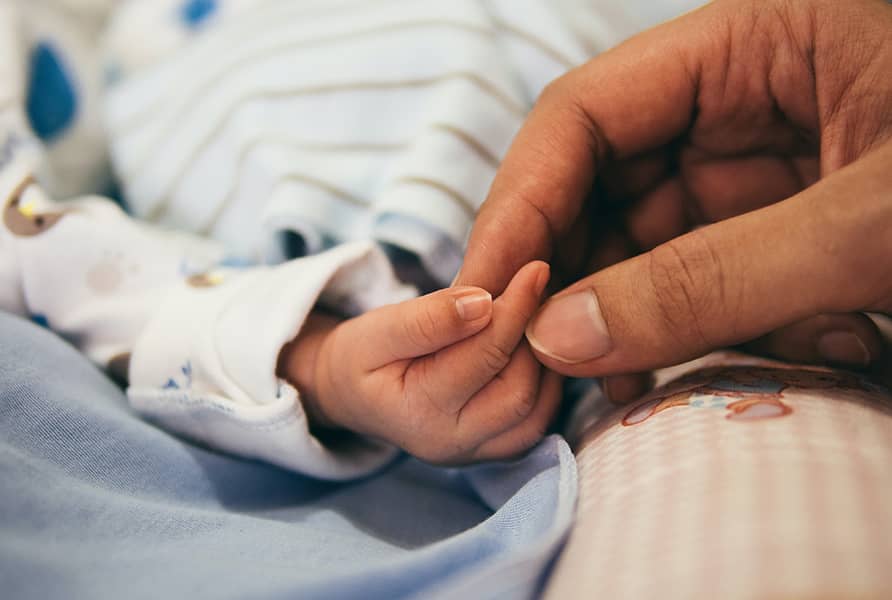HIE in Infants: What to Know About Hypoxic-Ischemic Encephalopathy

The day you welcome your newborn should be filled with joy and excitement. But for some families, birth complications turn that joy into fear and uncertainty.
One of the most serious conditions affecting babies at delivery is hypoxic-ischemic encephalopathy, or HIE, caused by the lack of oxygen to the child’s brain.
This guide explains HIE’s causes, signs, treatments, and legal options if negligence caused your child’s injury.
At Onward Injury Law, we can help you understand your options if your family has been impacted by this terrible condition.
What Exactly is HIE?
HIE is a type of brain damage caused by oxygen deprivation to the brain cells, impairing neurological function. It’s a leading cause of cerebral palsy, intellectual disabilities, and other impairments.
Causes include umbilical cord accidents, placental abruption, uterine rupture, and certain infections. When oxygen flow halts, brain damage starts within minutes. The effects depend on how long the brain goes without oxygen.
Up to 60% of infants affected by HIE die within their first few years of life or have permanent impairments. But, when identified early, some infants recover with prompt treatment and support.
Without treatment, HIE can have lifelong effects, including:
- Cerebral palsy
- Intellectual disability
- Speech/language delays
- Hearing and vision impairment
- Learning disorders
- Epilepsy or recurrent seizures
Rapid treatment is vital, but the long-term outlook still varies. In some cases, supportive care improves outcomes.
Spotting the Red Flags: Risk Factors for HIE
Certain pregnancy and labor complications increase the chances of interrupted oxygen flow and HIE, including:
- Fetal distress
- Prolonged, abrupt, or difficult labor
- Emergency C-section
- Uterine or placental insufficiency
- Poor oxygen supply during pregnancy
- Very high or low blood pressure in the mother
- Premature birth before 32 weeks
HIE signs often appear at birth or shortly after. They include lethargy, weak reflexes, seizures, tremors, poor feeding ability, and abnormal muscle tone.
Doctors use tests like EEG, MRI, CT scans, and medical history reviews to assess brain function and injury severity.
Moving Quickly to Treat & Reduce HIE Risk
When identified early, interventions like therapeutic hypothermia (cooling body temp by 3-4 degrees) can help preserve brain function and reduce the risk of death/disability.
Other supportive options involve medications, blood transfusions, rehabilitation therapy, and assistive equipment.
A devoted care team makes a big difference in minimizing neurological damage. But recovery takes time, treatment, and lifestyle adjustments.
While not always preventable, some steps promote a healthy pregnancy and delivery:
- Receiving regular prenatal checkups to catch issues early
- Following provider guidance on delivery planning
- Having a skilled delivery team prepared for emergencies
- Closely monitoring fetal heart rate for signs of distress
- Acting quickly if complications arise during labor
Could Negligence Have Caused My Child’s HIE?
As a parent, you may wonder – was my child’s brain injury just a birth complication, or did negligence play a role?
It’s tough to know if doctors or nurses made an error that caused the HIE. They rarely admit mistakes upfront. Typically, it’s up to you to speak to an experienced attorney.
They can investigate if care standards weren’t met based on similar situations.
Some potential red flags of negligence include:
- Failure to monitor mom and baby appropriately
- Avoidable delays responding to signs of fetal distress
- Administering the wrong medication or dosage
- Not reacting properly to oxygen deprivation indicators
Under Illinois law, you may be able to recover reduced damages.
Recovering After Negligence: Legal Options in Illinois
If deficiencies in medical care caused your child’s HIE, you may have grounds for a malpractice claim. In Illinois, you must file within two years of when the negligent act occurred or you became aware of the injury (per 735 ILCS 5/13-212).
To succeed, you must prove:
- Standards of care weren’t met
- Injury occurred
- Negligence directly caused the injury
- Damages resulted
This requires extensive evidence like medical records and expert testimony. An experienced medical malpractice attorney can help navigate the legal process.
Why Do I Need an Attorney After My Child’s HIE?
Deciding to pursue an HIE malpractice claim is tough. Many overwhelmed new parents delay calling a personal injury lawyer. But an initial discussion often provides relief.
Here are some key ways an experienced attorney can help:
- Retrieving medical records and birth logs to investigate events surrounding the oxygen deprivation
- Hiring independent medical experts to review records and determine if care standards were breached
- Handling complicated negotiations with health providers and insurance companies so you don’t have to
- Dealing with billing disputes and identifying sources of malpractice insurance coverage
- Determining all potential liable parties – doctors, nurses, hospitals, etc.
- Calculating current and future financial costs related to your child’s care
- Advising whether accepting a settlement offer is best
- Thoroughly preparing your case for trial if a fair settlement can’t be reached
- Presenting persuasive arguments in court supported by evidence and testimony
- Maximizing potential compensation to cover your child’s existing and future care needs
Having an attorney in your corner after a devastating HIE injury can make a big difference. They become your advocate, not the insurance company’s. By investigating your case, your lawyer can help you understand your options after this devastating injury.
Should I Consider Settlement Offers in My Child’s Case?
To avoid a trial, the hospital or doctor may offer a settlement. This can resolve the case faster than going to court. As trial approaches, defendants often increase settlement amounts, hoping to prevent an unfavorable verdict.
In some situations, settlement may be advisable to skip trial stress and unpredictability. And in other cases, accepting a settlement may mean losing out on the true value of your case. In both cases, we recommend consulting a medical malpractice lawyer before entering settlement talks. They can give guidance on the pros and cons and help you navigate the negotiation process.
Don’t Go It Alone – Contact Onward Injury Law
After a child’s HIE diagnosis, you may feel overwhelmed and unsure where to turn. But you don’t have to handle this alone. The dedicated attorneys at Onward Injury Law are here to support and guide you.
A Bloomington personal injury attorney can help you recover rightful compensation after birth injuries like HIE. They know this area of law inside out and will immediately get to work investigating what happened and preserving evidence.
Your attorney will build the strongest case possible on your behalf to secure the maximum compensation so you can access all available resources to care for your child now and in the future.
If you believe negligence during pregnancy or delivery caused your child’s HIE, don’t wait. Every day matters in preparing an injury claim. Reach out now for a free, no-obligation case evaluation.
Sources:
- Hypoxic Ischemic Encephalopathy: Pathophysiology and Experimental Treatments – PMC
- Neonatal Hypoxic-Ischemic Encephalopathy

